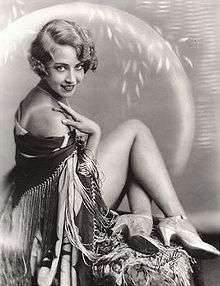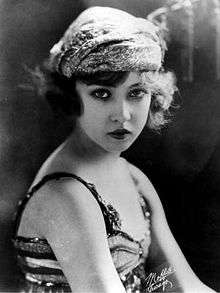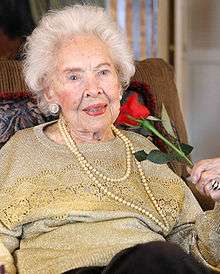Doris Eaton Travis
| Doris Eaton Travis | |
|---|---|
 in about 1920, during the Ziegfeld Follies years | |
| Born |
Doris Eaton March 14, 1904 Norfolk, Virginia, U.S. |
| Died |
May 11, 2010 (aged 106) Commerce, Michigan, U.S. |
| Cause of death | Aneurysm |
| Resting place |
Guardian Angel Cemetery Rochester, Michigan |
| Nationality | American |
| Other names |
Doris Levant Lucille Levant |
| Alma mater | University of Oklahoma |
| Occupation | Actress, dancer, dancer instructor, writer, rancher |
| Years active | 1910–2010 |
| Spouse(s) |
Joe Gorham (m. 1923–23) Paul Travis (m. 1930–2000) |
| Relatives |
Mary Eaton (sister) Pearl Eaton (sister) Charles Eaton (brother) |
Doris Eaton Travis (March 14, 1904 – May 11, 2010) was an American dancer, stage and film actress, dance instructor, writer, and rancher, who was the last of the acclaimed Ziegfeld girls.
She began performing onstage as a young child, and made her Broadway debut at the age of 13. A year later, in 1918, she joined the famed Ziegfeld Follies as the youngest Ziegfeld girl ever cast in the show. She continued to perform in stage productions and silent films throughout the 1920s and early 1930s. When her career in stage and screen declined, Travis started a second career as an Arthur Murray dance instructor and local television personality in Detroit. Her association with Arthur Murray lasted for three decades, during which time she rose through the ranks to own and manage a chain of nearly twenty schools. After retiring from her career with Arthur Murray, she went on to manage a horse ranch with her husband and returned to school, eventually earning several degrees.
As the last surviving Ziegfeld girl, Travis was featured in several books and documentaries about the Ziegfeld Follies years and her other stage endeavors. Travis had also returned to the stage as a featured performer in benefit performances.
Early life

She was one of seven children born to Mary and Charles Eaton in Norfolk, Virginia. She was raised as a Christian Scientist.[1] She was one of seven children in the family.[2] At the age of four, Travis began attending dance lessons in Washington, D.C., along with her sisters Mary and Pearl Eaton. In 1911, all three sisters were hired for a production of Maurice Maeterlinck's fantasy play The Blue Bird at the Shubert Belasco Theatre in Washington. While Travis had a minor role in the show, as a sleeping child in the Palace of Night scene, it marked the beginning of her career in professional theatre.[3]
Career
Theatre
After The Blue Bird, in 1912, the three Eaton sisters and their younger brother Joe began appearing in various plays and melodramas for the Poli Stock Company. They quickly gained reputations as professional, reliable, and versatile actors, and were rarely out of work.[3]
In 1915, all three sisters appeared in a new production of The Blue Bird for Poli. Doris and Mary were given the starring roles of Mytyl and Tyltyl. The siblings were subsequently invited to reprise their roles for a New York and road tour of the play, produced by the Shubert Brothers. When the show closed, Doris and her brother Charles, who had followed his four siblings into show business, resumed their work with Poli and appeared together in their first Broadway show, Mother Carey's Chickens at the Cort Theatre. The entire Eaton family relocated to New York City, where the children pursued their careers in various stage projects.[3][4]
Ziegfeld Follies
By 1918, Pearl Eaton had become a dancer and assistant to the director with the Ziegfeld Follies. The Follies were a series of elaborate musical revues on Broadway in New York City from 1907 through 1931. Inspired by the Folies Bergère of Paris, the Follies were conceived and produced by Florenz Ziegfeld.[5] When Travis accompanied Pearl to a rehearsal, dance supervisor Ned Wayburn spotted her and hired her for a role in the summer touring company of the 1918 Follies.[6][7]
The day she finished the eighth grade, Travis began rehearsals to become a Ziegfeld girl in the Follies.[8] To circumvent child labor laws and the attention of the Gerry Society, she performed under the stage names "Doris Levant" (her young niece's name) and "Lucille Levant". As soon as she turned sixteen, she began using her real name again. Wayburn was one of only a few people who were aware of her true age, and arranged for her mother to accompany her on the Follies tour as a paid member of the company.[3][7]
Travis would associate with Ziegfeld for several years, appearing in the 1918, 1919, and 1920 editions of the Ziegfeld Follies and the 1919 Midnight Frolics.[4] She was the understudy to star Marilyn Miller. Travis was not the only member of the Eaton family to prosper in the show: by 1922, siblings Mary, Pearl, Doris, Joe, and ten-year-old Charles had all performed in one edition of the Follies or another. Her last appearance with the Follies was in the 1920 edition.[3][6]
Film
Travis made her motion picture debut at the age of 17 in the 1921 romantic drama At the Stage Door, opposite silent film star Billie Dove. Her career flourished in the 1920s and early 1930s. She appeared in a number of additional silent films, including Tell Your Children with director Donald Crisp in England and Egypt; performed in five different Broadway shows and danced in the Hollywood Music Box Revue and the Gorham Follies in Los Angeles and the Hollywood Club in New York.[3][6][9]
While in the Hollywood Music Box Revue, Travis premiered two important songs, both composed by Nacio Herb Brown: "Singin' in the Rain" and "The Doll Dance." Travis was the lyricist for the latter song, but did not receive due credit. In 1929 she also appeared in the now lost The Very Idea.
At the age of 18, she married Joe Gorham, the producer of the Gorham Follies. The union lasted for six months, ending when Gorham died of a heart attack.[3][6]
Dance instructor and ranching
Travis performed in her final Broadway show, Merrily We Roll Along, at the Music Box Theatre, in 1935.[4] Her career, along with those of her siblings, declined in the 1930s. She returned to work in stock theatrical productions on Long Island and had a brief, unsuccessful foray into vaudeville with her brother Charles.[3]
In 1936, she was hired by the Arthur Murray Dance Studios in New York as a tap dance instructor. She remained with the Arthur Murray company for thirty-two years, advancing from teaching to owning her own school. She eventually established and owned a total of eighteen Arthur Murray studios across Michigan. She also authored a column of dance advice and commentary for the Detroit News entitled "On Your Toes" and hosted a local television program for seven years.[3][7][10]
One of her pupils, inventor and engineer Paul Travis, became her husband after an 11-year courtship. Their marriage lasted over fifty years, until Paul's death in 2000; they had no children.[3][10] After retiring from the dance studio business in 1968, Travis and her husband moved to Norman, Oklahoma, and established a ranch. The initial 220-acre (89 ha) plot grew to 880 acres (356 ha), and many of the quarter-horses bred and raised on the ranch had success in racing. The ranch operated largely as a boarding facility, managed by Travis, until 2008.[6][10]
Later years

In 1992, aged 88, Travis graduated cum laude from the University of Oklahoma.[3] She was awarded an honorary doctorate from Oakland University in 2004 at the age of 100.
In 1997, she and four former Ziegfeld Girls reunited for the reopening of the New Amsterdam Theatre. She later recalled that she was the only one still able to dance.[2]
In 1998, Travis returned to Broadway and the New Amsterdam Theatre, the same venue where she had first appeared in 1918, 80 years earlier, to participate in the Easter Bonnet Competition, a benefit for Broadway Cares/Equity Fights AIDS. She became the show's "lucky charm" and an audience favorite, and continued to appear in the production almost every year, often presenting renditions of her old dances to standing ovations from the audience.[3][7][11] In 1999 she made her first film appearance in over sixty-five years with a small role in Man on the Moon with Jim Carrey.[9]
She appeared in several documentaries and interviews about the Ziegfeld Follies and her siblings and colleagues; she also published an autobiography and family history, entitled The Days We Danced, in 2003, turning 100 the next year.[2] In 2006, Travis was the subject of a photo-collage biography by Pulitzer Prize nominee Lauren Redniss entitled Century Girl: 100 Years in the Life of Doris Eaton Travis, Last Living Star of the Ziegfeld Follies.
In January 2008, Travis served as the Grand Marshal of the opening parade for the Art Deco Weekend festival in Miami Beach.[10] Her last public appearance was the opening of the 2010 Easter Bonnet show on April 27, 2010.[12]
Death
On May 11, 2010, Travis died of an aneurysm in Commerce, Michigan at the age of 106.[12][13] On May 12, the lights of Broadway were dimmed in her honor.[2] She is interred in the Guardian Angel Cemetery in Rochester, Michigan.[14]
Filmography
| Year | Title | Role | Notes | |
|---|---|---|---|---|
| 1921 | At the Stage Door | Betty | ||
| 1922 | The Broadway Peacock | Rose Ingraham | ||
| 1922 | Tell Your Children | Rosny Edwards | ||
| 1922 | The Call of the East | Mrs. Burleigh | ||
| 1923 | High Kickers | |||
| 1923 | Fashion Follies | Doris - the Leading Dancer | ||
| 1928 | Taking the Count | Second daughter | ||
| 1929 | Street Girl | Singer at Club Joyzelle | ||
| 1929 | The Very Idea | Edith Goodhue | ||
"Protect Your Daughter-aka: Reckless Decision"
Helen Devereux |
1999 | Man on the Moon | Eleanor Gould |
" |
See also
References
- ↑ Comer, Ruby."Ruby's Rap" aumag.org, August 2004. The third question asks if Doris is a healthy girl and Doris answers, "Yes, I am. I don't take any medicine. I'm a Christian Scientist, Ruby".
- 1 2 3 4 McElroy, Tom (11 May 2010). "Last Broadway Ziegfeld Follies Girl dies at 106". Associated Press. Archived from the original on May 14, 2010. Retrieved 12 May 2010.
- 1 2 3 4 5 6 7 8 9 10 11 12 Travis, Doris Eaton (2003). The Days We Danced. Marquand Books. ISBN 0-8061-9950-4.
- 1 2 3 "Doris Eaton Travis at the Internet Broadway Database". Retrieved 2008-02-06.
- ↑ Kenrick, John."Florenz Ziegfeld:Biography - Part II" Musicals101.com, accessed May 12, 2010
- 1 2 3 4 5 Wilson, Victoria (January 1999). "Doris Eaton Travis, a former Ziegfeld Follies dancer". Interview. Archived from the original on 2007-10-06. Retrieved 2008-02-06.
- 1 2 3 4 Simonson, Robert (April 17, 2004). "Nearly) Oldest Living Ziegfeld Girl Tells All: 100-Year-Old Doris Eaton Visits New Amsterdam Once More". Playbill Online. Retrieved 2008-02-06.
- ↑ Kenrick, John."Florenz Ziegfeld, Jr. article, "What Makes A 'Ziegfeld Girl'"? Musicals101.com, accessed May 12, 2010
- 1 2 "Doris Eaton Travis at the Internet Movie Database". Retrieved 2008-02-06.
- 1 2 3 4 Orkin Emmanuel, Lisa (January 18, 2008). "Oldest living Ziegfeld girl kicks off annual Art Deco Weekend". Associated Press. Retrieved 2008-02-06.
- ↑ Viagas, Robert (April 20, 2005). "Easter Bonnet Competition Raises $2.5 Million". Playbill Online. Retrieved 2008-02-06.
- 1 2 Jones, Kenneth and Simonson, Robert."Doris Eaton Travis, Among the Last of the Ziegfeld Girls, Dead at 106" Playbill, May 11, 2010
- ↑ Martin, Douglas (May 11, 2010). "Doris E. Travis, Last of the Ziegfeld Girls, Dies at 106". The New York Times.
- ↑ "Doris Eaton Travis" findagrave.com, accessed August 29, 2011
- ↑ Rereleased by Alpha Home Entertainment (ALP5085D)2006
Further reading
- Redniss, Lauren. Century Girl: 100 Years in the Life of Doris Eaton Travis, Last Surviving Star of the Ziegfeld Follies, New York, Harper Collins, 2006, ISBN 978-0-06-085333-4.
External links
| Wikimedia Commons has media related to Doris Eaton Travis. |
- Interview with Midnight Palace in 2010
- Interview with Lauren Redniss
- Profile of Travis from Art Deco Weekend 2008
- NPR: The Oldest Living Ziegfeld Girl
- Doris Eaton Travis at the Internet Movie Database
- Doris Eaton Travis at Find a Grave